David McRaney's Blog, page 6
October 29, 2023
YANSS 272 – How to develop the mental skills required to know when to stick to your plans and when to abandon them
I recently sat down for a live event and Q&A with the great Annie Duke to discuss her new book, new book Quit: The power of knowing when to walk away. This episode is the audio from that event. Quit is all about how to develop a very particular skill: how to train your brain to make it easier to know which goals and plans are worth sticking to and which are not.
Apple – RSS – Patreon – Simplecast – Spotify – Amazon – Audible
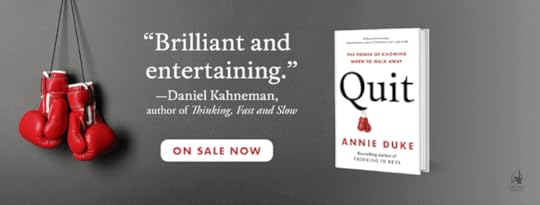
OFFICIAL DESCRIPTION OF THE BOOK:
Business leaders, with millions of dollars down the drain, struggle to abandon a new app or product that just isn’t working. Governments, caught in a hopeless conflict, believe that the next tactic will finally be the one that wins the war. And in our own lives, we persist in relationships or careers that no longer serve us. Why? According to Annie Duke, in the face of tough decisions, we’re terrible quitters. And that is significantly holding us back.
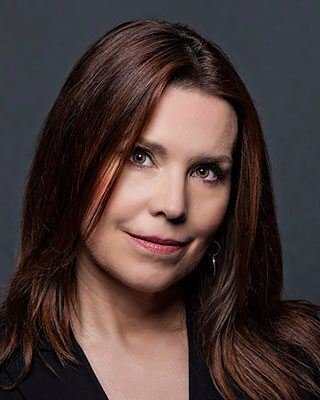 Annie Duke
Annie DukeIn Quit, Duke teaches you how to get good at quitting. Drawing on stories from elite athletes like Mount Everest climbers, founders of leading companies like Stewart Butterfield, the CEO of Slack, and top entertainers like Dave Chappelle, Duke explains why quitting is integral to success, as well as strategies for determining when to hold em, and when to fold em, that will save you time, energy, and money.
You’ll learn:
How the paradox of quitting influences decision making: If you quit on time, you will feel you quit earlyWhat forces work against good quitting behavior, such as escalation commitment, desire for certainty, and status quo biasHow to think in expected value in order to make better decisions, as well as other best practices, such as increasing flexibility in goal-setting, establishing “quitting contracts,” anticipating optionality, and conducting premortems and backcastsWhether you’re facing a make-or-break business decision or life-altering personal choice, mastering the skill of quitting will help you make the best next move.
Apple – RSS – Patreon – Simplecast – Spotify – Amazon – Audible – Google
October 15, 2023
YANSS 271 – The psychology behind the apocalyptic anxieties of billionaire preppers
In this episode we sit down with Douglas Rushkoff, a media scholar, journalist, and professor of digital economics who has a new fire in his belly when it comes to the world of billionaire preppers, which comes across in his new book Survival of the Richest: Escape Fantasies of the Tech Billionaires – inspired by his invitation to consult a group of the world’s richest people on how to spend their money now to survive an apocalypse they fear is coming within their lifetimes.
Listen on Apple Listen on Spotify Listen on GoogleRSS – Simplecast – Amazon Music – Audible

OFFICIAL DESCRIPTION OF THE BOOK:
Five mysterious billionaires summoned theorist Douglas Rushkoff to a desert resort for a private talk. The topic? How to survive the “Event”: the societal catastrophe they know is coming. Rushkoff came to understand that these men were under the influence of The Mindset, a Silicon Valley–style certainty that they and their cohort can break the laws of physics, economics, and morality to escape a disaster of their own making—as long as they have enough money and the right technology.
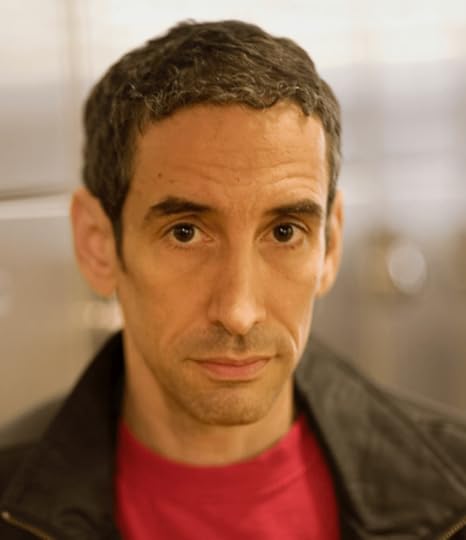 Douglas Rushkoff
Douglas RushkoffIn Survival of the Richest, Rushkoff traces the origins of The Mindset in science and technology through its current expression in missions to Mars, island bunkers, AI futurism, and the metaverse. In a dozen urgent, electrifying chapters, he confronts tech utopianism, the datafication of all human interaction, and the exploitation of that data by corporations. Through fascinating characters—master programmers who want to remake the world from scratch as if redesigning a video game and bankers who return from Burning Man convinced that incentivized capitalism is the solution to environmental disasters—Rushkoff explains why those with the most power to change our current trajectory have no interest in doing so. And he shows how recent forms of anti-mainstream rebellion—QAnon, for example, or meme stocks—reinforce the same destructive order.
Named one of the “world’s ten most influential intellectuals” by MIT, Douglas Rushkoff is a professor of Media Theory and Digital Economics at the City University of New York, he is one of the original cyberpunks, a friend of Timothy Leary’s and a titan of technology journalism who coined the terms viral media, digital native, and social currency. His bestsellers include Coercion, Present Shock, Throwing Rocks and the Google Bus, Program or Be Programmed, Life Inc, and Media Virus, and his famed PBS Frontline documentaries include Generation Like, The Persuaders, and Merchants of Cool. He is also the host of the Team Human podcast.
Links and SourcesApple – RSS – Patreon – Spotify – Amazon – Audible – Google – Simplecast
October 9, 2023
YANSS 270 – Defining, undefining, and redefining the word “genius”
In this show, you’ll hear the first episode of a documentary series I made for Himalaya, an audio service devoted to inspirational and educational content, that asked me if I had any ideas for a book that I had yet to pursue, and sure enough, I did. Over the course of this audio documentary series, I explore the history and science of intelligence, IQ, and remarkable talent through interviews with dozens of intelligence experts and actual “geniuses.” By the end we get a much better picture of genius as a cultural construct and consider how we can unlock its positive potential within ourselves.
Listen on Apple Listen on Spotify Listen on GoogleRSS – Simplecast – Amazon Music – Audible
With that documentary as my foundation, I’m currently writing a new book with what, at first, seems like a simple thesis: “What does the word ‘genius’ really mean, and how come it is so hard to get an answer to that question?”
I hit the road immediately after I finished how How Minds Change and began work on answering those two questions, and it turned out to be the most complex project I’ve ever undergone. I have since spent time with the man with the highest IQ ever recorded, the youngest person with the highest-known IQ, visited MENSA headquarters, and interviewed the world’s leading experts on intelligence, creativity, and the various “gifted” programs around the world. I’ve also embedded myself with modern eugenicists and visited schools whose missions, for better or worse, is to create geniuses.
Currently, I’m spending time with cognitive linguists and other experts who study meaning-making itself and how we attempt to articulate the ineffable through language, literature, poetry, art, math, and more. I can’t wait to show you what I’ve found.
LINK TO GET THE HEAR FIRST EPISODE AND GET TWO-WEEKS OF HIMALAYA FOR FREE
Links and SourcesApple – RSS – Simplecast – Spotify – Amazon – Audible – Google Podcasts
September 14, 2023
YANSS 269 – Deconstructing How Minds Change with Michael Taft
In celebration of How Minds Change, my new book, turning one-year-old, in this episode Michael Taft interviews David McRaney about how minds do and do not change, the process behind writing a book about that, and what he has learned since writing and promoting it.
Michael is a meditation teacher, bestselling author, and a mindfulness coach – and he specializes in secular, science-based mindfulness training. If you are interested in a science-based, secular book about meditation and and mindfulness, I highly recommend his book,The Mindful Geek, snd I recommend guided meditation with him. He offers that at The Alembic in Berkeley. You can join them virtually, over the internet. Links below.
I also recommend his podcast, Deconstructing Yourself. It is all about entheogens and neurofeedback and brain hacking. If you are a Carl Sagan loving, science endorsing, evidence based sort of person – a nerd, geek, or skeptic or humanist who wants to know more about meditation and deep dive into what we do and do not know about it – that’s what his podcast is about. Sam Harris will be a guest on there soon, and I think many of you will love that episode.
Listen on Apple Listen on Spotify Listen on GoogleRSS – Simplecast – Amazon Music – Audible
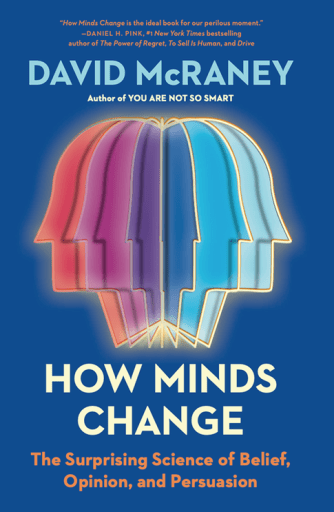
OFFICIAL DESCRIPTION OF THE BOOK
A brain-bending investigation of why some people never change their minds—and others do in an instant—by the bestselling author of You Are Not So Smart
What made a prominent conspiracy-theorist YouTuber finally see that 9/11 was not a hoax? How do voter opinions shift from neutral to resolute? Can widespread social change only take place when a generation dies out? From one of our greatest thinkers on reasoning, HOW MINDS CHANGE is a book about the science, and the experience, of transformation.
When self-delusion expert and psychology nerd David McRaney began a book about how to change someone’s mind in one conversation, he never expected to change his own. But then a diehard 9/11 Truther’s conversion blew up his theories—inspiring him to ask not just how to persuade, but why we believe, from the eye of the beholder.
Delving into the latest research of psychologists and neuroscientists, HOW MINDS CHANGE explores the limits of reasoning, the power of groupthink, and the effects of deep canvassing.
Told with McRaney’s trademark sense of humor, compassion, and scientific curiosity, it’s an eye-opening journey among cult members, conspiracy theorists, and political activists, from Westboro Baptist Church picketers to LGBTQ campaigners in California – that ultimately challenges us to question our own motives and beliefs. In an age of dangerous conspiratorial thinking, can we rise to the occasion with empathy?
An expansive, big-hearted journalistic narrative, HOW MINDS CHANGE reaches surprising and thought-provoking conclusions, to demonstrate the rare but transformative circumstances under which minds can change.
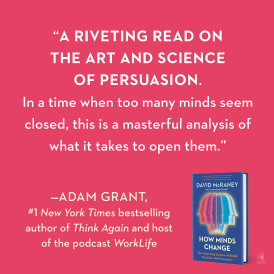
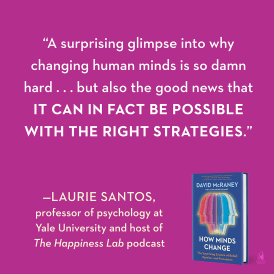
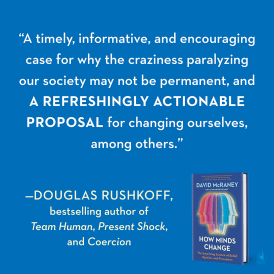
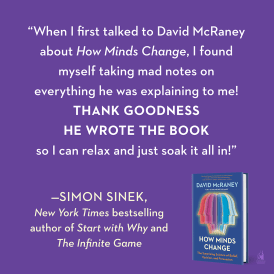
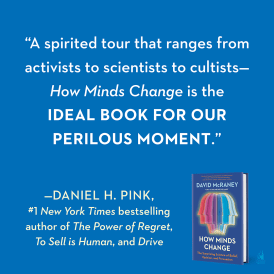 Links and Sources
Links and SourcesApple – RSS – Simplecast – Spotify – Amazon – Audible – Google Podcasts
September 8, 2023
YANSS 268 – The game we can’t escape, the psychology behind our perpetual drive to pursue status
In this episode we welcome back author Will Storr whose new book, The Status Game, feels like required reading for anyone confused, curious, or worried about how politics, cults, conspiracy theories communities, social media, religious fundamentalism, polarization, and extremism are affecting us – everywhere, on and offline, across cultures, and across the world.
What is The Status Game? It’s our primate propensity to perpetually pursue points that will provide a higher level of regard among the people who can (if we provoked such a response) take those points away. And deeper still, it’s the propensity to, once we find a group of people who regularly give us those points, care about what they think more than just about anything else.
In the interview, we discuss our inescapable obsession with reputation and why we are deeply motivated to avoid losing this game through the fear of shame, ostracism, embarrassment, and humiliation while also deeply motivated to win this game by earning what will provide pride, fame, adoration, respect, and status.
Listen on Apple Listen on Spotify Listen on GoogleRSS – Simplecast – Amazon Music – Audible
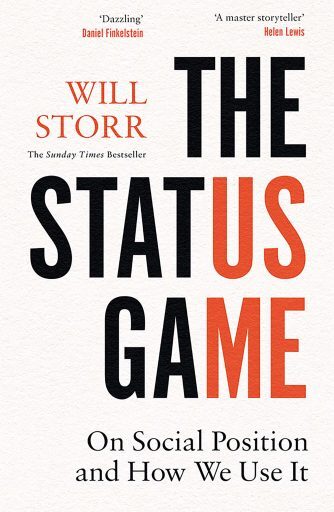
OFFICIAL DESCRIPTION OF THE BOOK
For centuries, philosophers and scholars have described human behaviour in terms of sex, power and money. In The Status Game, bestselling author Will Storr radically turns this thinking on its head by arguing that it is our irrepressible craving for status that ultimately defines who we are.
From the era of the hunter-gatherer to today, when we exist as workers in the globalised economy and citizens of online worlds, the need for status has always been wired into us. A wealth of research shows that how much of it we possess dramatically affects not only our happiness and wellbeing but also our physical health – and without sufficient status, we become more ill, and live shorter lives. It’s an unconscious obsession that drives the best and worst of us: our innovation, arts and civilisation as well as our murders, wars and genocides. But why is status such an all-consuming prize? What happens if it’s taken away from us? And how can our unquenchable thirst for it explain cults, moral panics, conspiracy theories, the rise of social media and the ‘culture wars’ of today?
On a breathtaking journey through time and culture, The Status Game offers a sweeping rethink of human psychology that will change how you see others – and how you see yourself.
 Will Storr
Will StorrWill Storr is an award-winning writer. He’s the author of six critically acclaimed books, including the novel The Hunger and The Howling of Killian Lone and the Sunday Times bestseller The Science of Storytelling. His journalism has appeared in titles such as The Guardian, The Sunday Times, The New Yorker and The New York Times. His prizes include a National Press Club award for excellence and the AFM award for Best Investigative Journalism. His work on sexual violence against men earned the Amnesty International Award and a One World Press Award. He’s also been presented with the AIB Award for Best Investigative Documentary for his BBC radio series.
He teaches popular storytelling classes in London and has been invited to present his Science of Storytelling workshop all over the world. He’s an in-demand ghostwriter whose books have spent months at the top of the Sunday Times bestseller chart and have sold more than two million copies.
Links and SourcesApple – RSS – Simplecast – Spotify – Amazon – Audible – Google Podcasts
August 19, 2023
YANSS 267 – Why the people who are most likely to suggest that you “do your own research” are also the least likely to do their own research
Sedona Chinn, a researcher who studies how people make sense of competing scientific, environmental, and health-related claims, joins us to discuss her latest research into doing your own research. In her latest paper she found that the more a person values the concept of doing your own research, the less likely that person is to actually do their own research. In the episode we explore the origin of the concept, what that phrase really means, and the implications of her study on everything from politics to vaccines to conspiratorial thinking.
Listen on Apple Listen on Spotify Listen on GoogleRSS – Simplecast – Amazon Music – Audible
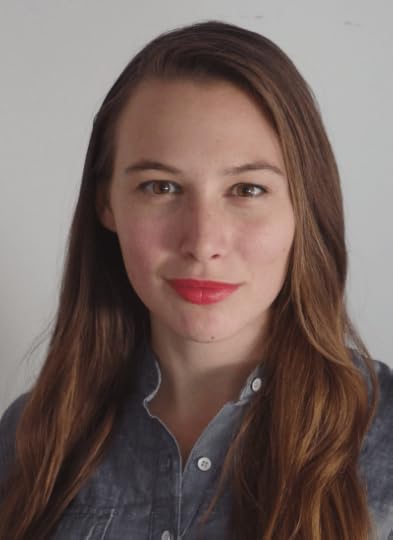 Sedona Chinn
Sedona ChinnSedona Chinn is an Assistant Professor in Life Sciences Communication at the University of Wisconsin-Maidson.
She researches how social media influence perceptions of expertise and accuracy of beliefs surrounding science and health. Her ongoing work explores how empowering messages and aspirational wellness content on social media are associated with perceptions of experts, health beliefs, and political attitudes.
USDA Hatch-funded research is currently investigating how Instagram influencers inform beliefs about nutrition and agriculture. I explore how influential opinion leaders online cultivate credibility and use emotional appeals to spread accurate and inaccurate information about food and agriculture.
She also investigates the prevalence and effects of scientific disagreements in media to better understand how people evaluate uncertain information.
In this research, she has used computational content-analytic methods to measure politicization and polarization in climate change news and COVID-19 news.
She pairs large-scale content analyses with experimental work to investigating effects of civil and uncivil scientific disagreement messages and the efficacy of consensus messages in the context of climate change.
Mapping digital wellness content ‘Doing your own research” associated with misinformation, mistrust Links and SourcesApple Podcasts – RSS – Google Podcasts – Simplecast – Amazon Music – Audible – Spotify
YANSS 267 – Why people who are most likely to suggest that others “do their own research” are also the least likely to do their own research
Sedona Chinn, a researcher who studies how people make sense of competing scientific, environmental, and health-related claims, joins us to discuss her latest research into doing your own research. In her latest paper she found that the more a person values the concept of doing your own research, the less likely that person is to actually do their own research. In the episode we explore the origin of the concept, what that phrase really means, and the implications of her study on everything from politics to vaccines to conspiratorial thinking.
Listen on Apple Listen on Spotify Listen on GoogleRSS – Simplecast – Amazon Music – Audible
 Sedona Chinn
Sedona ChinnSedona Chinn is an Assistant Professor in Life Sciences Communication at the University of Wisconsin-Maidson.
She researches how social media influence perceptions of expertise and accuracy of beliefs surrounding science and health. Her ongoing work explores how empowering messages and aspirational wellness content on social media are associated with perceptions of experts, health beliefs, and political attitudes.
USDA Hatch-funded research is currently investigating how Instagram influencers inform beliefs about nutrition and agriculture. I explore how influential opinion leaders online cultivate credibility and use emotional appeals to spread accurate and inaccurate information about food and agriculture.
She also investigates the prevalence and effects of scientific disagreements in media to better understand how people evaluate uncertain information.
In this research, she has used computational content-analytic methods to measure politicization and polarization in climate change news and COVID-19 news.
She pairs large-scale content analyses with experimental work to investigating effects of civil and uncivil scientific disagreement messages and the efficacy of consensus messages in the context of climate change.
Mapping digital wellness content ‘Doing your own research” associated with misinformation, mistrust Links and SourcesApple Podcasts – RSS – Google Podcasts – Simplecast – Amazon Music – Audible – Spotify
YANSS 266 – The psychology behind Project Alpha, the hoax and publicity stunt meant to improve scientific rigor and debunk the supernatural
We sit down with Brian Brushwood to discuss how he put together this most recent season of The World’s Greatest Con, his podcast about incredible scams. This season is all about how two boys pulled off an incredible hoax called Project Alpha, a con job and a publicity stunt meant to improve scientific rigor and methodology when it comes to studying the possibility of the existence of psychic phenomena.
Listen on Apple Listen on Spotify Listen on GoogleRSS – Simplecast – Amazon Music – Audible
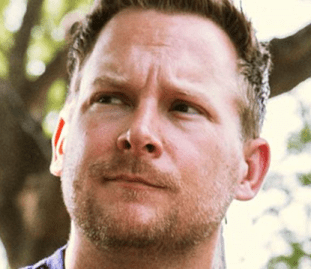 Brian Brushwood
Brian Brushwood“Cons don’t fool us because we’re stupid, they fool us because we’re human.”
In this episode, we sit down with Brushwood, a famed stage magician and infamous instructor of the school of scams whose podcast explores the world’s greatest con artists and con jobs from World War II to modern game shows. In the new season, he tells the story of how two teenagers scammed a group of scientists into believing their subjects were powerful psychics.
THE WORLD’S GREATEST CON WEBSITE
The World’s Greatest Con Season Three is all about about how, in the 1970s, as teenage boys – as teenage magicians – two people worked their way into a secret psychic soldier program conducted at a hidden laboratory. Then they held a press conference about it, and things got messy.
Links and SourcesApple Podcasts – RSS – Google Podcasts – Simplecast – Amazon Music – Audible – Spotify
YANSS 265 – Jennifer Shahade explains how we can better understand obsession, strategy, representation, sexism, and sideways thinking by exploring the world of professional chess players
In this episode we sit down with Jennifer Shahade, a two-time U.S. Women’s Chess Champion, author, speaker, and professional poker player whose new book, Chess Queens, is the true story of the greatest female players of all time interwoven with her own experiences as a chess champion.
Listen on Apple Listen on Spotify Listen on GoogleRSS – Simplecast – Amazon Music – Audible
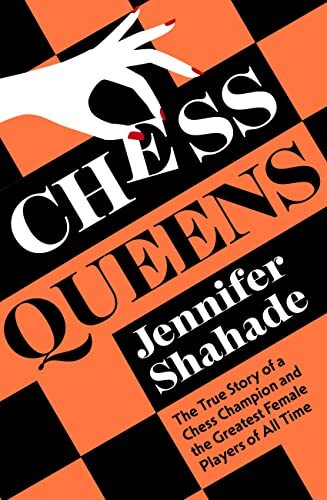
OFFICIAL DESCRIPTION OF THE BOOK
For fans of The Queen’s Gambit, this is the real life story of a female chess champion travelling the world to compete in a male-dominated sport with the most famous players of all time.
Jennifer Shahade, a two-time US Women’s Chess Champion, spent her teens and twenties travelling the world playing chess. Tournaments have taken her from Istanbul to Moscow, and introduced her to players from Zambia to China. In this ultra male-dominated sport, Jennifer found shocking sexism, as well as an incredible history of the top female players that has often been ignored. But she also found friendships, feminism and hope.
Through her own story as well as in-depth profiles of pioneers of the game , Jennifer invites us into the extremely competitive world of chess. She shows us the rivalry and the camaraderie; the ecstatic highs and the excruciating losses; the glamour and the hard work. She describes the coach who told her that her period will affect her standard of play, and gives us thrilling blow by blow accounts of the matches that made history.
Intertwined with Jennifer’s own story are those of the top female players from around the world. We meet the famous Polgar sisters, the three Hungarian girls who were all child prodigies; we meet the glamorous jet setters who travel the world partying, and the players who escaped war-torn countries to become champions against the odds.
Chess Queens is a fascinating glimpse into the exhilarating world of chess and an essential book for all the aspiring chess queens of today.
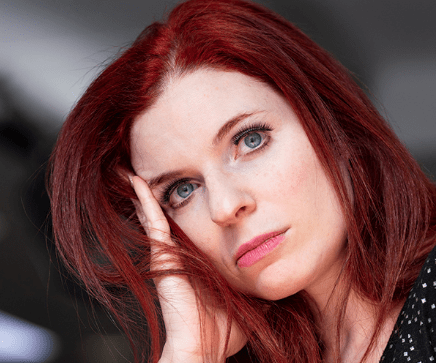 Jennifer Shahade
Jennifer ShahadeJennifer Shahade grew up in a family of gamers.
Her brother is IM Greg Shahade is founder of the PRO Chess League and the US Chess School, while her mother, Dr. Sally Solomon (1940-2013), was an avid bridge and poker player. Her father, FM Michael Shahade is a four-time state champion and taught her chess at five. Jennifer did not take to the game right away, gravitating instead to acting and writing. When she got back into it in high school, she fell in love and quickly improved, becoming a National Master at the age of 16, and the first female to win the US Junior Open. She went on to win two US Chess Women’s Championship titles and a Silver Olympic medal.
Jennifer’s joint passion for games and art led to dozens of creative projects through her career, including authoring Chess Queens, which chronicles the true stories of the top women players in history, intertwined with Jennifer’s own life. She’s also the host of two award-winning podcasts, the GRID and Ladies Knight. The show is a game within a game, as Jen fills out the entire 169 grid of possible poker hands, with no repeats.
Jennifer is the MindSports Ambassador at PokerStars and loves to show how games like poker and chess can help anyone make better decisions. Her titles include a Championship belt at the Open Face High Roller Championship in Prague. Jennifer fights to make games more inclusive through her work with US Chess Women, where she helps bring chess to girls, gender minorities and women. She’s also an ambassador for Poker Power, an organization that aims to “flip the table” and teach one million women poker.
Links and SourcesApple Podcasts – Google Podcasts – Spotify
RSS – Simplecast – Amazon Music – Audible
July 11, 2023
YANSS 264 – How to psychologically inoculate yourself against scams, cons, and chicanery
In an era in which we have more information available to us than ever before, when claims of “fake news” might themselves be, in fact, fake news, Daniel Simons and Christopher Chabris, authors of The Invisible Gorilla, are back to offer us a vital tool to not only inoculate ourselves against getting infected by misinformation but prevent us from spreading it to others, a new book titled Nobody’s Fool.
Listen on Apple Listen on Spotify Listen on GoogleRSS – Simplecast – Amazon Music – Audible
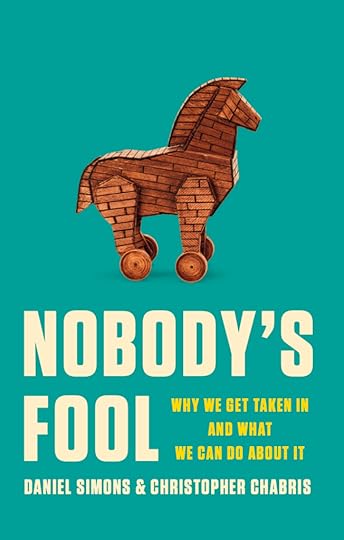
— OFFICIAL DESCRIPTION OF THE BOOK–
From two New York Times-bestselling psychologists, “an engaging master class in how to foil purveyors of false promises” (Philip E. Tetlock, author of Superforecasting)
From phishing scams to Ponzi schemes, fraudulent science to fake art, chess cheaters to crypto hucksters, and marketers to magicians, our world brims with deception. In Nobody’s Fool, psychologists Daniel Simons and Christopher Chabris show us how to avoid being taken in. They describe the key habits of thinking and reasoning that serve us well most of the time but make us vulnerable—like our tendency to accept what we see, stick to our commitments, and overvalue precision and consistency. Each chapter illustrates their new take on the science of deception, describing scams you’ve never heard of and shedding new light on some you have. Simons and Chabris provide memorable maxims and practical tools you can use to spot deception before it’s too late.
Informative, illuminating, and entertaining, Nobody’s Fool will protect us from charlatans in all their forms—and delight us along the way.
It’s no secret that American health care has become too costly and politicized to help everyone. So where do you turn if you can’t afford doctors, or don’t trust them? In this book, Matthew Hongoltz-Hetling examines the growing universe of non-traditional treatments — including some that are really non-traditional.
With costs skyrocketing and anti-science sentiment spreading, the so-called “medical freedom” movement has grown. Now it faces its greatest challenge: going mainstream. In these pages you’ll meet medical freedom advocates including an international leech smuggler, a gold miner-turned health drink salesman who may or may not be from the Andromeda galaxy, and a man who says he can turn people into zombies with aerosol spray. One by one, these alternative healers find customers, then expand and influence, always seeking the one thing that would take their businesses to the next level–the support and approval of the government.
Should the government dictate what is medicine and what isn’t? Can we have public health when disagreements over science are this profound? No, seriously, can you turn people into flesh-eating zombies? If It Sounds Like a Quack asks these critical questions while telling the story of how we got to this improbable moment, and wondering where we go from here. Buckle up for a bumpy ride…unless you’re against seatbelts.
 Dr. Dan Simons
Dr. Dan SimonsDr. Daniel Simons [pronounced: SY-muns] is a professor of psychology at the University of Illinois where he heads the Visual Cognition Laboratory and has courtesy appointments in the Charles H. Sandage Department of Advertising and the Gies College of Business. Dan received his B.A. from Carleton College and his Ph.D. from Cornell University. His research explores the limits of awareness and memory, the reasons why we often are unaware of those limits, and the implications of such limits for our personal and professional lives. For more information, visit dansimons.com.
 Dr. Christopher Chabris
Dr. Christopher ChabrisDr. Christopher Chabris [pronounced: shuh-BREE] is a cognitive scientist who has taught at Union College and Harvard University and is a Fellow of the Association for Psychological Science. His research focuses on decision-making, attention, intelligence, and behavior genetics. Chris received his Ph.D. in psychology and A.B. in computer science from Harvard University. He is a chess master, poker amateur, and games enthusiast; for three years he wrote the “Game On” column in The Wall Street Journal. For more information, visit chabris.com.
Apple Podcasts – RSS – Google Podcasts – Spotify
RSS – Simplecast – Amazon Music – Audible
David McRaney's Blog
- David McRaney's profile
- 582 followers



